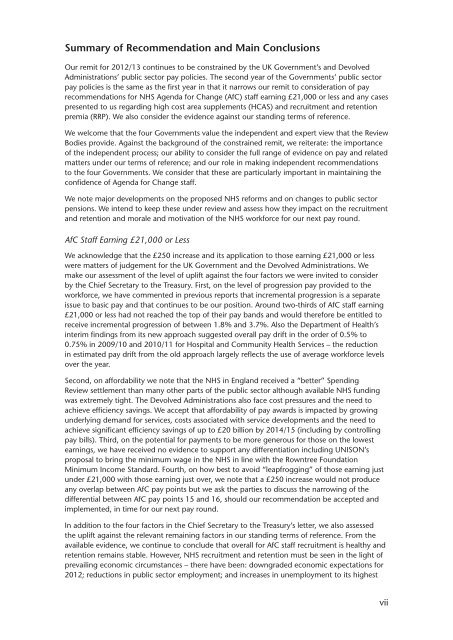NHS pay review body: twenty-sixth report 2012 - Official Documents
NHS pay review body: twenty-sixth report 2012 - Official Documents
NHS pay review body: twenty-sixth report 2012 - Official Documents
Create successful ePaper yourself
Turn your PDF publications into a flip-book with our unique Google optimized e-Paper software.
Summary of Recommendation and Main Conclusions<br />
Our remit for <strong>2012</strong>/13 continues to be constrained by the UK Government’s and Devolved<br />
Administrations’ public sector <strong>pay</strong> policies. The second year of the Governments’ public sector<br />
<strong>pay</strong> policies is the same as the first year in that it narrows our remit to consideration of <strong>pay</strong><br />
recommendations for <strong>NHS</strong> Agenda for Change (AfC) staff earning £21,000 or less and any cases<br />
presented to us regarding high cost area supplements (HCAS) and recruitment and retention<br />
premia (RRP). We also consider the evidence against our standing terms of reference.<br />
We welcome that the four Governments value the independent and expert view that the Review<br />
Bodies provide. Against the background of the constrained remit, we reiterate: the importance<br />
of the independent process; our ability to consider the full range of evidence on <strong>pay</strong> and related<br />
matters under our terms of reference; and our role in making independent recommendations<br />
to the four Governments. We consider that these are particularly important in maintaining the<br />
confidence of Agenda for Change staff.<br />
We note major developments on the proposed <strong>NHS</strong> reforms and on changes to public sector<br />
pensions. We intend to keep these under <strong>review</strong> and assess how they impact on the recruitment<br />
and retention and morale and motivation of the <strong>NHS</strong> workforce for our next <strong>pay</strong> round.<br />
AfC Staff Earning £21,000 or Less<br />
We acknowledge that the £250 increase and its application to those earning £21,000 or less<br />
were matters of judgement for the UK Government and the Devolved Administrations. We<br />
make our assessment of the level of uplift against the four factors we were invited to consider<br />
by the Chief Secretary to the Treasury. First, on the level of progression <strong>pay</strong> provided to the<br />
workforce, we have commented in previous <strong>report</strong>s that incremental progression is a separate<br />
issue to basic <strong>pay</strong> and that continues to be our position. Around two-thirds of AfC staff earning<br />
£21,000 or less had not reached the top of their <strong>pay</strong> bands and would therefore be entitled to<br />
receive incremental progression of between 1.8% and 3.7%. Also the Department of Health’s<br />
interim findings from its new approach suggested overall <strong>pay</strong> drift in the order of 0.5% to<br />
0.75% in 2009/10 and 2010/11 for Hospital and Community Health Services – the reduction<br />
in estimated <strong>pay</strong> drift from the old approach largely reflects the use of average workforce levels<br />
over the year.<br />
Second, on affordability we note that the <strong>NHS</strong> in England received a “better” Spending<br />
Review settlement than many other parts of the public sector although available <strong>NHS</strong> funding<br />
was extremely tight. The Devolved Administrations also face cost pressures and the need to<br />
achieve efficiency savings. We accept that affordability of <strong>pay</strong> awards is impacted by growing<br />
underlying demand for services, costs associated with service developments and the need to<br />
achieve significant efficiency savings of up to £20 billion by 2014/15 (including by controlling<br />
<strong>pay</strong> bills). Third, on the potential for <strong>pay</strong>ments to be more generous for those on the lowest<br />
earnings, we have received no evidence to support any differentiation including UNISON’s<br />
proposal to bring the minimum wage in the <strong>NHS</strong> in line with the Rowntree Foundation<br />
Minimum Income Standard. Fourth, on how best to avoid “leapfrogging” of those earning just<br />
under £21,000 with those earning just over, we note that a £250 increase would not produce<br />
any overlap between AfC <strong>pay</strong> points but we ask the parties to discuss the narrowing of the<br />
differential between AfC <strong>pay</strong> points 15 and 16, should our recommendation be accepted and<br />
implemented, in time for our next <strong>pay</strong> round.<br />
In addition to the four factors in the Chief Secretary to the Treasury’s letter, we also assessed<br />
the uplift against the relevant remaining factors in our standing terms of reference. From the<br />
available evidence, we continue to conclude that overall for AfC staff recruitment is healthy and<br />
retention remains stable. However, <strong>NHS</strong> recruitment and retention must be seen in the light of<br />
prevailing economic circumstances – there have been: downgraded economic expectations for<br />
<strong>2012</strong>; reductions in public sector employment; and increases in unemployment to its highest<br />
vii
















